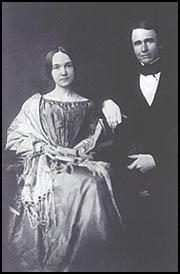Mary Boykin Chesnut
Mary Miller was born in Pleasant Hill, South Carolina, on 31st March, 1823. The daughter of Stephen Miller, the governor of South Carolina, and Mary Boykin, Mary attended private schools in Camden and Charleston.
On 23rd April, 1840, Mary married James Chesnut, the owner of a large plantation in Mulberry, South Carolina. When Chesnut was elected to the Senate in 1858, Mary accompanied her husband to Washington.
On the outbreak of the American Civil War Chesnut joined the Confederate Army and became a military aide to General P. G. T. Beauregard. Promoted to the rank of general, Chesnut worked as an advisor to President Jefferson Davis. Mary always accompanied her husband during the war and spent time in Charleston, Montgomery, Columbia and Richmond.

Chesnut was opposed to slavery but believed in the right of the Southern states to leave the Union. Between February, 1861 and July, 1865, Chesnut kept a 400,000 word diary of the conflict.
After the war Mary wrote three novels. However, none of these were published during her lifetime. Mary Boykin Chesnut died in Camden, South Carolina, on 22nd November, 1886. Her book, A Diary From Dixie, was not published until 1905.
Primary Sources
(1) Mary Boykin Chesnut, Charleston, South Carolina, diary entry (13th April, 1861)
Fort Sumter has been on fire. Anderson has not yet silenced any of our guns. So the aides, still with swords and red sashes by way of uniform, tell us. But the sound of those guns makes regular meals impossible. None of us go to table. Tea trays pervade the corridors going everywhere. Some of the anxious hearts lie on their beds and moan in solitary misery.
(2) Mary Boykin Chesnut, Richmond, Virginia, diary entry (27th June, 1861)
Mrs. Davis is as kind as ever. She met us in one of the corridors accidentally and asked us to join her party and to take our meals at her table. As soon as my husband heard we had arrived, he came, too. After dinner he sat smoking, the solitary chair of the apartment tilted against the door as he smoked, and my poor dresses were fumigated. I remonstrated feebly. "War times," said he: "nobody is fussy now."
In Mrs. Davis' drawing room last night, the president took a seat by me on the sofa where I sat. He talked for nearly an hour. He laughed at our faith in our own powers. We are like the British. We think every Southerner equal to three Yankees at least. We will have to be equivalent to a dozen now. He said only fools doubted the courage of the Yankees or their willingness to fight what they saw fit. And now that we have stung their pride, we have roused them till they will fight like devils.
(3) Mary Boykin Chesnut, Richmond, Virginia, diary entry (1st January, 1864)
General Hood's an awful flatterer - I mean an awkward flatterer. I told him to praise my husband to someone else, not to me. He ought to praise me to somebody who would tell my husband, and then praise my husband to another person who would tell me. Man and wife are too much one person; to wave a compliment straight in the face of one another is not graceful.
One more year of "Stonewall" would have saved us. Chickamauga is the only battle we have gained since "Stonewall" died, and no results follow as usual. "Stonewall" was not so much killed by a Yankee; he was shot by his own men; that is hard. General Lee can do no more than keep back Meade. "One of Meade's armies, you mean," said I, "for they have only to double on him when Lee whips one of them." If General Lee had had Grant's resources, he would have bagged the last Yankee or have had them all safe back in Massachusetts.
(4) Mary Boykin Chesnut, Columbia, South Carolina, diary entry (1st January, 1864)
Yesterday, we went to the capitol grounds to see our returned prisoners. We walked slowly up and down until Jefferson Davis was called upon to speak. There I stood, almost touching the bayonets when he left me. I looked straight into the prisoners faces, poor fellows. They cheered with all their might, and I wept for sympathy and enthusiasm. I was very deeply moved. These men were so forlorn, so dried up and shrunken, with such a strange look in some of their eyes; others so restless and wild looking; others, again, placidly vacant, as if they had been dead to the world for years.
(5) Mary Boykin Chesnut, Columbia, South Carolina, diary entry (24th September, 1864)
These stories of our defeats in the valley fall like blows upon a dead body. Since Atlanta fell, I have felt as if all were dead within me forever. The reserves, as somebody said, have been secured only by robbing the cradle and the grave - the men too old, the boys too young.

